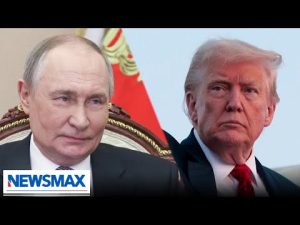In a surprising twist of economic fate, Russia’s economy seems to be holding its own despite the backdrop of over three years of war, massive military expenses, and a barrage of economic sanctions that would make most nations buckle at the knees. While many eyes are on President Trump and his threats of tougher economic sanctions, it seems the Russian bear isn’t just surviving; it’s adapting. The question on everyone’s mind is: How long can this economic juggling act last?
War has acted as an unexpected booster shot for Russia’s economy. Since the onset of its full-scale invasion of Ukraine, Moscow has ramped up military spending, which—surprisingly—has kept employment rates surprisingly low. In fact, unemployment in Russia has dropped to levels not seen in thirty years! Picture this: even a bread factory has pivoted from making dough to whipping up drones! Who knew yeast could take on such a high-tech twist? It’s clear that anyone and everyone in Russia is pulling their weight in a bid to support the war effort.
However, the financial resources fueling this enthusiastic military spending largely stem from Russia’s oil and gas sector, which accounts for about 20% of its GDP. This sector has served as a sturdy backbone for the economy, maintaining momentum even as soldiers march forward. But here’s the kicker: while the economy has managed to outpace many advanced nations, including the U.S., concerns are mounting. Major cracks are beginning to show, and the looming threat of President Trump’s sanctions could send shockwaves through Russian financial foundations.
As the global political stage changes, Russian President Vladimir Putin appears resolute in his ambitions to secure as much of Ukraine as possible. Even with the pressure mounting from external forces, experts predict that Russia will continue to maintain its military-focused economy for the foreseeable future, with an eye not just on Ukraine, but on potential conflicts that might arise elsewhere. Russia’s defense spending is projected to peak in 2025, but that’s only if a ceasefire is eventually reached. It’s a precarious balancing act as they plan to keep military spending elevated, all in the name of what they perceive as threats—NATO being their favorite bogeyman.
While some might be waiting for the proverbial shoe to drop, Russia appears to be navigating through this tumultuous sea of sanctions and warfare with an uncanny knack for resilience. The economic landscape, while not without its problems, shows a nation willing to adapt at almost every turn. As Trump readies his economic arsenal, one must wonder if Russia will skate through these challenges or whether the economic consequences will finally pull the rug out from underneath them. In the unending chess game of global politics, both sides are poised for a strategic showdown, and the outcome could pivot the course of international relations for years to come.







